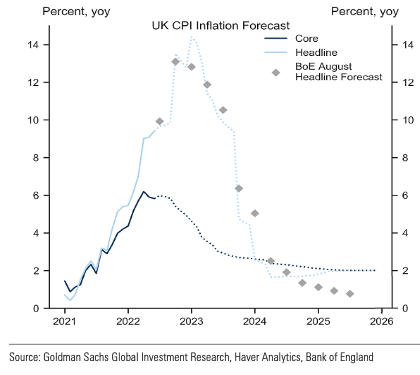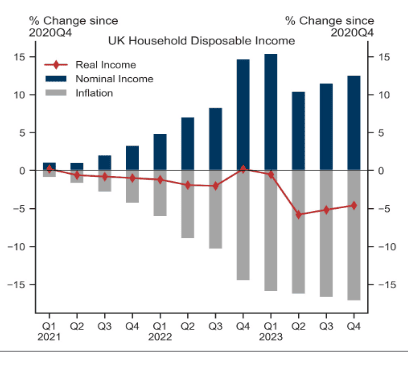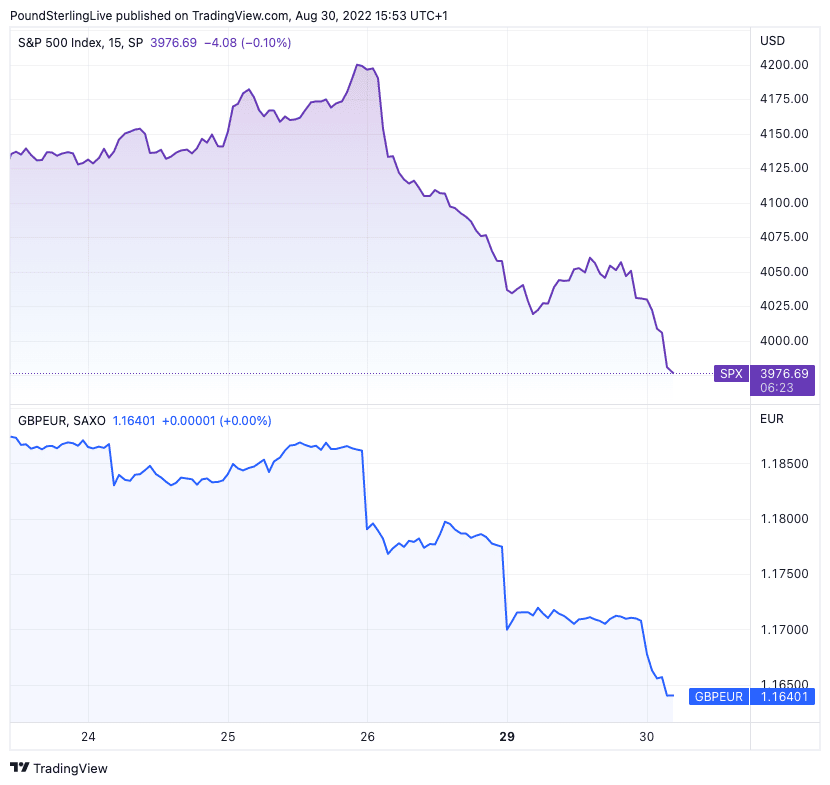Pound Sterling: Losses Mount against Euro and Dollar
- Written by: Gary Howes
- GBP suffers strong selling pressure
- More losses look likely
- Goldman Sachs warns UK economy to shrink next year
- Global market selloff also weighs
- EUR boosted by falling gas prices
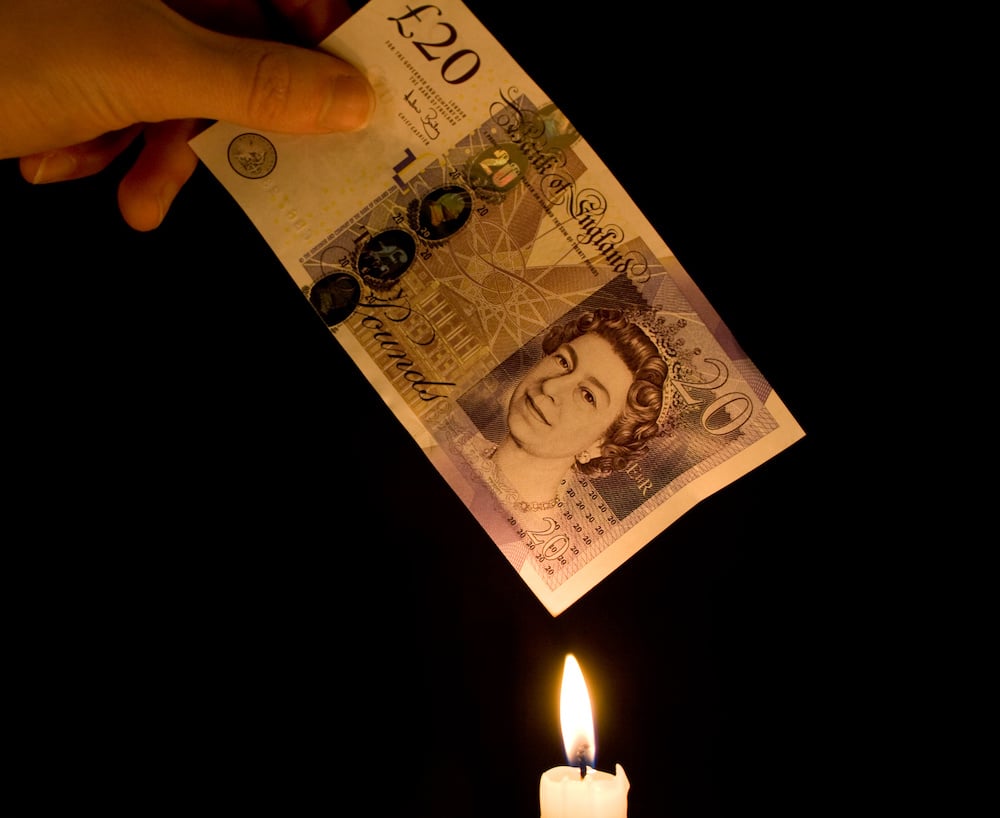
Image © Adobe Images
Pound Sterling looks set to test yet new lows against the Euro, Dollar and other major currencies amidst dire investor sentiment towards the UK and ongoing weakness in global equity markets.
The Pound has fallen 1.33% against the Euro already this week and if these losses are sustained is on course for its largest weekly slump against the single currency since May.
The UK currency meanwhile remains in a relentless selloff against the Dollar, having lost a further 0.83% since this week started. The 2022 loss now stands at 14%.
As August comes to an end we can now confirm the Pound is the worst performing major currency of the month, having lost value to all its G10 rivals:
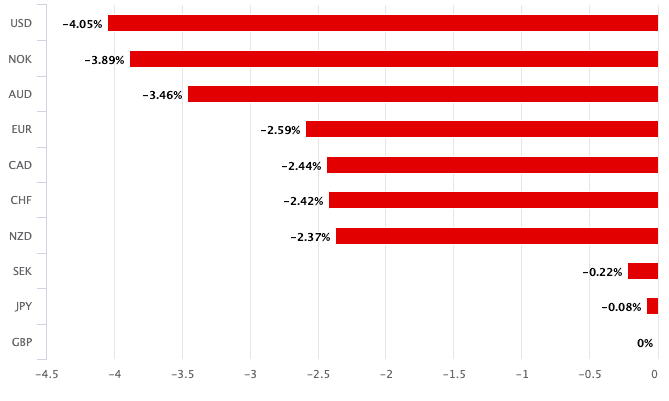
Above: GBP performance this August. To keep on top of the market, set your FX rate alert here.
The Pound's decline reflects a pervasive negative sentiment amongst global investors that looks unshakable and therefore further losses are likely.
Given it's current performance and trends the UK currency is on course to be the worst performing major currency of 2022, within a matter of weeks.
*To speak to a foreign currency payments expert about the outlook and its implications for your payments, Horizon Currency are here to help. They are one of the remaining payment providers that offer one-on-one service, while still offering bank-beating exchange rates (3-5% more FX than the bank), please get in touch here. *Advertisement.
Sentiment towards the Pound took another bashing with the release of a new forecast and research note from the highly influential investment bank Goldman Sachs, which showed inflation in the country will likely peak at 14.8% in January 2023.
Goldman Sachs says consumption is likely to decline significantly as inflation rises and they downgrade their growth outlook sharply, expecting the UK to enter a recession starting in the fourth quarter.
The UK economy is now forecast to contract by 0.6% in 2023.
Above: UK inflation will continue to soar.
"We see risks as skewed towards a more severe and protracted recession. Gas prices may remain elevated for longer, households may unwind their excess savings to a lesser extent and the amount of additional fiscal support to households may turn out to be smaller than assumed in our baseline," says Chief European Economist at Goldman Sachs, Sven Jari Stehn.
Under such scenarios, UK real GDP would likely contract by 2.5% to 3.4% over the next year.
Above: "Real Disposable Incomes Expected to Decline Sharply" - Goldman Sachs.
Goldman Sachs' current baseline forecasts assume the recent spike in European and UK gas prices will not persist.
But, they view persistently higher gas prices as an upside risk to their forecast.
"In a scenario where gas prices remain elevated at current levels, we would expect the price cap to increase by over 80% in January (vs 19% assumed in our baseline), which would imply headline inflation peaking at 22.4%," says Stehn.
"Sterling is trying to hold the line but there is not a great outlook here and calling the bottom will be tricky. Recession vibes from GS in yesterday’s well-circulated note that warned inflation could top 22%," says Neil Wilson, Chief Market Analyst at Markets.com.
Compare Currency Exchange Rates
Find out how much you could save on your international transfer
Estimated saving compared to high street banks:
£2,500.00
Free • No obligation • Takes 2 minutes
Pound Sterling is meanwhile also suffering amidst another selloff in global stock markets and the weakness will unlikely end until this selloff ends.
The UK currency is traditionally aligned to global investor sentiment, rising when investors are positive and buying financial assets and falling when the opposite is true.
Therefore, a recent selloff in global stocks has seen the Pound to Euro exchange rate (GBP/EUR slump to 1.1630 and the Pound to Dollar exchange rate (GBP/USD) to 1.1652.
"Sharp declines across both sides of the Atlantic," says Joshua Mahony, senior market analyst at IG. "Unfortunately, markets will be at risk for some time yet."
Federal Reserve Chair Jerome Powell on Friday sparked a market selloff when he said the Fed will do "whatever it takes" to bring inflation back to the 2.0% target, even as that may cause pain in terms of lower growth and higher unemployment.
The comments, made at the Jackson Hole symposium, lead investors to price in a sharp contraction in global growth.
Above: The U.S. S&P 500 index falls, taking the GBP/EUR (bottom) with it.
These fears were exacerbated Tuesday with the release of consumer confidence data out of the U.S. showing confidence actually improved in August, thanks largely to falling petrol and diesel prices.
This will only encourage the Fed to maintain a course of drastic action on interest rates to cool the economy, spelling more misery for global investors and businesses as the cost of funding increases.
Only when market sentiment finally improves and markets start rising again will the Pound begin to reclaim lost value.
Euro Bests the Pound as Gas Prices Fall
Plummeting natural gas prices have meanwhile proven supportive of Euro exchange rates.
European and UK Gas price contracts for future delivery are down sharply this week, aiding the Euro back above parity against the Dollar and extending a multi week run of gains against the Pound.
"A retreat in European natural gas futures after the Commission promised emergency intervention and reform in the power market came as a breath of fresh air for the euro," says Marios Hadjikyriacos, Senior Investment Analyst at XM.com.
Compare Currency Exchange Rates
Find out how much you could save on your international transfer
Estimated saving compared to high street banks:
£2,500.00
Free • No obligation • Takes 2 minutes
Gas Infrastructure Europe reports Europe had by Sunday met the EU's target to replenish storage to 80% of capacity by November.
"With almost 80% of gas storage filled, we have nearly reached our target for this year," European Commission President
Ursula von der Leyen told the Baltic Sea Energy Security Summit.
"These stores of gas are being filled at absolute peak prices, ordinarily you’d hope to have filled them when the price is very low. In Germany, was driven by Government backed loans to utilities essentially buying at any price," says Faisal Islam, Economics Editor at BBC.
With storage targets ahead of where they should be physical demand will ease going forward as gas companies can opt to be more price responsive when meeting remaining storage needs.
Above: The EU gas price benchmark has fallen sharply. Image courtesy of @ChrisGiles_
European Union Commission President Ursula von der Leyen said Monday the EU intends to introduce notable reform to European energy markets.
The current market structure means even electricity that is relatively cheap to produce, such as wind and solar power, is expensive to buy if gas prices are high, pushing up costs for utilities and households.
It is hoped the final price of wholesale electricity can be disentangled from the price of its most expensive component, in this case that generated from gas.
Should investors sense the worst of Europe's energy crisis is near, they might start backing the Euro again, spelling more losses for the Pound-Euro exchange rate.
Compare Currency Exchange Rates
Find out how much you could save on your international transfer
Estimated saving compared to high street banks:
£2,500.00
Free • No obligation • Takes 2 minutes

